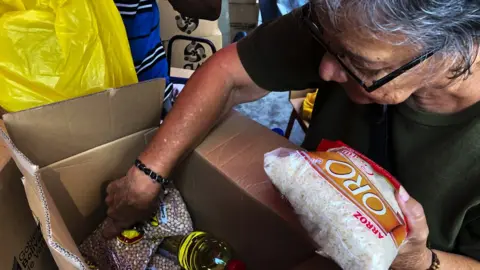Venezuela crisis: Vast corruption network in food programme, US says
 Getty Images
Getty ImagesUS officials have accused Venezuelan President Nicolás Maduro and his allies of profiting from a food subsidy scheme as the country suffers acute shortages.
For years, a "vast corruption network" made money from overvalued contracts while only a fraction of the food for the state-run programme was imported, the US treasury department said.
It imposed sanctions on 10 people, including Mr Maduro's three stepsons.
Mr Maduro called the measures a sign of "desperation" by "the gringo empire".
Oil-rich Venezuela has faced chronic shortages of food and medicine as a result of a years-long political and economic crisis, and a large number of people say they do not have access to enough food.
The Local Committees for Supply and Production scheme, known by its Spanish acronym Clap, was created by the Maduro government in 2016 to distribute food boxes at subsidised prices.
Colombian national Alex Nain Saab ran a network that obtained no-bid, overvalued contracts from the Venezuelan government, including from the food programme, the US treasury department said.
In 2016, Mr Saab allegedly set up a firm to acquire food outside Venezuela and ship it to the country. He has been accused of reaping profits and importing only a fraction of the food that had been contracted.
According to the allegations, Mr Saab and Alvaro Enrique Pulido Vargas, his business partner, have paid bribes and kickbacks to officials to win overvalued contracts from as early as 2009.
In one of them, involving the construction of 25,000 low-income houses, they were paid three to four times their actual cost.
The Treasury said the people hit by sanctions had enriched themselves through government contracts, including Mr Maduro's stepsons Walter, Yosser and Yoswal Flores, who allegedly received kickbacks from Mr Saab's companies.
"Alex Saab engaged with Maduro insiders to run a wide scale corruption network they callously used to exploit Venezuela's starving population," Treasury Secretary Steven Mnuchin said in a statement.
"[Authorities] use food as a form of social control, to reward political supporters and punish opponents, all the while pocketing hundreds of millions of dollars through a number of fraudulent schemes."
The sanctions also hit 13 companies that were said to be involved in the scheme.
Mr Maduro, who is already under US sanctions, said on state television: "Imperialists, prepare for more defeats, because the Clap in Venezuela will continue... No-one takes the Clap away from the people."
Hours later, the US Attorney's Office for the Southern District of Florida said it had charged Mr Saab and Mr Pulido with money laundering and conspiracy for conduct between 2011 and 2015, in accusations that were not related to Venezuela's food programme.
A lawyer for Mr Saab, as well as the Venezuelan government, did not immediately respond to the allegations.
The US is one of the more than 50 nations which does not recognise President Maduro and his government, arguing that his re-election last year was illegitimate.
It has given its backing to the head of the National Assembly, Juan Guaidó, who declared himself president in January. Mr Maduro has often accused the US of an "economic war" against his government and of trying to orchestrate a coup against him.
